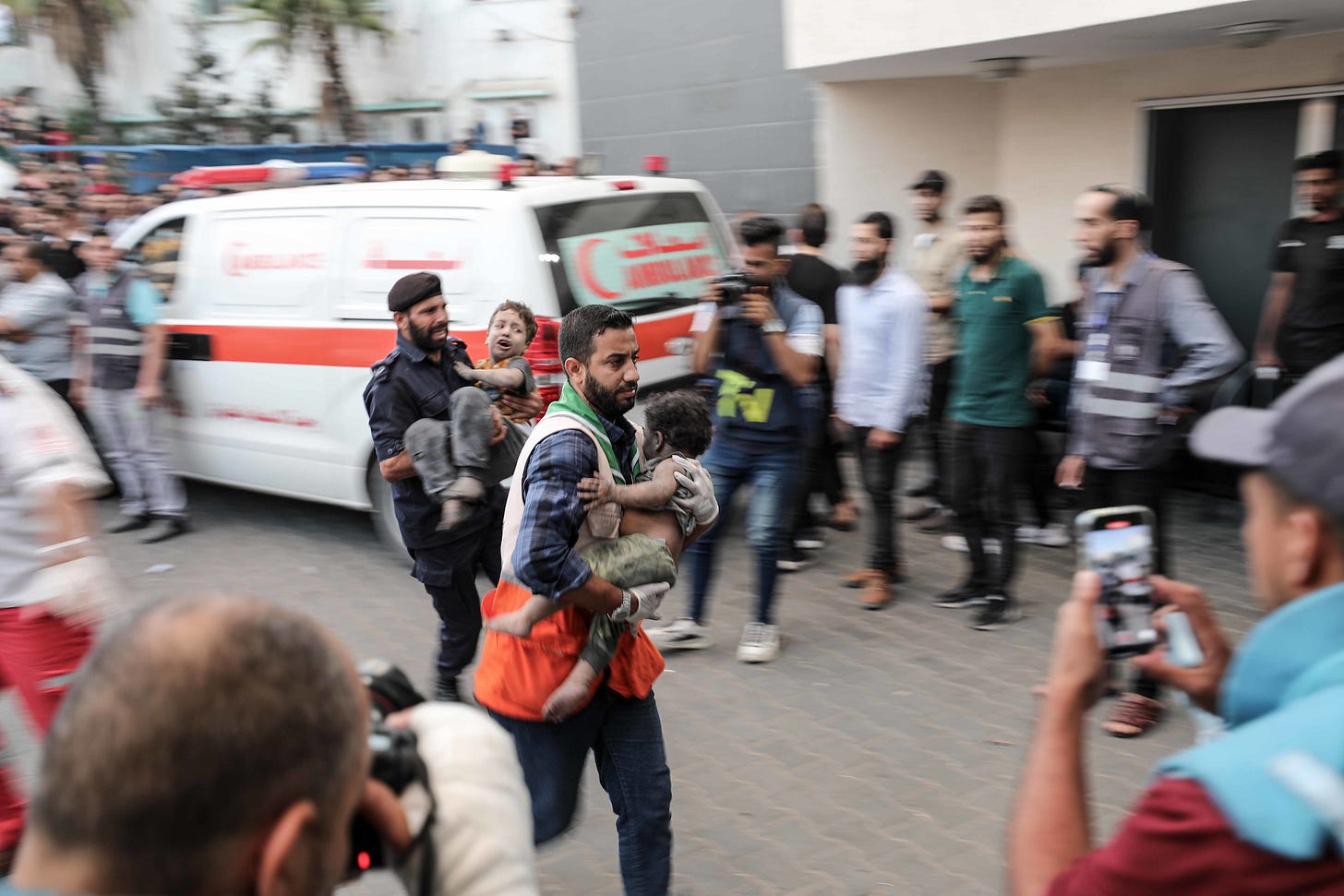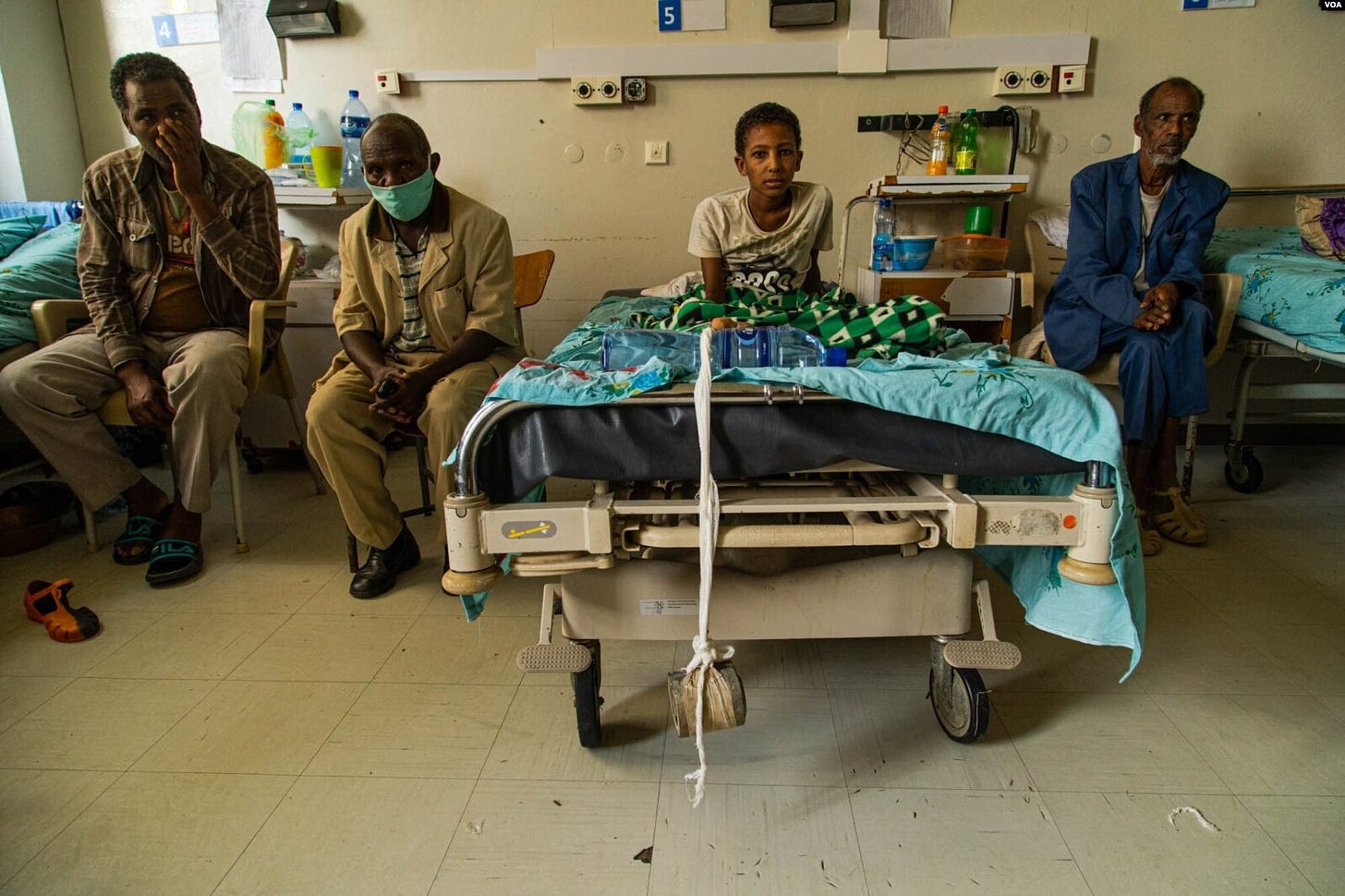9/11 and the Holocaust don't explain the Israel-Palestine war
Western leaders are casting a typically brutal ethnic conflict as war of good and evil, with dangerous consequences.

Two years eleven months and four days before Hamas attacked Israeli towns, the Tigray War began. The fighting between Tigrayan separatists and the Ethiopian government killed hundreds of thousands of people, and included atrocities of the most gruesome nature, from murder by machete to mass rape. The war barely made the news in Western countries. Western media treated it as an exotic side story, and Western leaders quietly called on all sides to make peace.
The brutal escalation of the Israeli-Palestinian conflict this month, on the other hand, has brought out comparisons to the West’s worst traumas. Some of Israel’s supporters have invoked 9/11 to justify harsh Israeli retaliation. Others, including U.S. President Joe Biden, said that the attacks by Hamas guerrillas were the “deadliest day for Jews since the Holocaust,” and invoked the memory of that earlier genocide as a call for pro-Israel action today.
Palestinians and their supporters have invoked the same history in the opposite direction. The thirst for revenge, they say, resembles the American bloodlust after 9/11 that led to so many disastrous wars. Israeli leaders’ dehumanization of Palestinians, they warn, resembles the dehumanization of Jews that led to the Holocaust.
Neither of these metaphors really fits the Israeli-Palestinian conflict. The violence this month did not start with a random act of destruction like 9/11, but is one ugly chapter in a long struggle between Israelis and Palestinians. And Palestinians are a stateless nation living under Israeli control. Neither side is a disarmed and defenseless minority like European Jews were during World War II. Relying on these examples risks confusing the issue or even justifying atrocities.
There are other examples that fit like a glove. And those examples happened in places with foreign names like Dersim, Biafra, Karen State, Srebrenica, Karabakh, Darfur, Ossetia, and Tigray. All of these places witnessed ethnic conflict, often between a powerful ethnostate and armed ethnic rebels. Understanding these conflicts is the key to understanding how the Israeli-Palestinian conflict got here and where it is going.
The Tigray War is an especially recent example with an especially close resemblance to the current Israeli-Palestinian violence. It began with rebels attacking civilians, which in turn invited brutal retaliation from the government. The state of Tigray, set to lose much of its power to Ethiopia’s central government, declared independence in November 2020. After that came an orgy of ethnic violence, setting the tone for the war that followed.
A week after the declaration of independence, Tigrayan militiamen took over a small town called Mai Kadra. They went door-to-door searching for non-Tigrayans, with a special interest in Amharans, members of Ethiopia’s largest ethnic group. Then the killings began. The militiamen attacked their victims with machetes, knives, and axes. When the Ethiopian army arrived a few days later, they found hundreds of bodies chopped up, burned, or half eaten by dogs.
The retribution was swift and enormous. Amharan militias, now in control of Mai Kadra, began marking Tigrayans for death in much the same way Tigrayan militias had rounded up Amharans. And that was just the beginning. The Ethiopian government and allied Eritrea blockaded Tigray, indiscriminately bombed Tigrayan towns, shot Tigrayan civilians en masse, and raped Tigrayan women as a weapon of war.
That is the brutal logic of ethnic conflict, where the goal is to break the spirit of the enemy population and drive them off their lands. The weaker side often uses savage acts of terror to shock the enemy public. The stronger side tries to show that it is in control with even more terror. A government can afford to carry out this terror in a more cold and systematic way, through air raids and starvation, although it often unleashes young conscripts to carry out acts of personal butchery as well.
The same logic is on display in Israel and Palestine today. A week ago, Hamas guerrillas broke the siege on the Palestinian enclave of Gaza and stormed through Israeli villages, killing or capturing hundreds of civilians. Like the Mai Kadra massacre, the Hamas attack provoked a brutal Israeli retaliation against Palestinians. Within a day, Israeli leaders announced their intention to punish the “human animals” of Gaza by cutting off food, water, and electricity to the enclave. They also cut off Internet access, the same tactic used by the Ethiopian government in Tigray.

Over the past few days, the Israeli military has begun depopulating the northern half of Gaza, ordering civilians to evacuate and then reportedly bombing the evacuation convoys. There is talk of “evacuating” Palestinians further onto Egyptian soil. Israeli president Isaac Herzog and Israeli ambassador Gilad Erdan have implied that all Palestinians in Gaza share some responsibility for Hamas’s brutality. Meanwhile, Hamas has threatened to execute Israeli hostages in response to air raids.
During the Tigray War, the United States and its allies had pushed for a ceasefire along with “accountability” for any war crimes. There was a basic understanding that violence begets more violence, and that even if some acts of cruelty had to be punished, any end to the war would require a compromise to resolve the underlying tensions. When it comes to Israel and Palestine, however, Western leaders want the Israeli state to seek revenge until victory. In fact, the White House called it “disgraceful” to seek a ceasefire in Gaza.
The reason is obvious: violence against Israelis is more real to Westerners than violence against civilians in other parts of the world. Western audiences have been treated to nonstop media coverage of Hamas atrocities in extremely graphic detail, including details that are not confirmed facts. Western leaders are going on solidarity tours of Israel and meeting with hostages' families.
Much of that reaction can be chalked up to geopolitics. Israel is a U.S. ally. It is “our side.” Many American elites have worked closely with Israeli counterparts and are primed to see Palestinians as the enemy. Kfar Aza, where some of the worst killing by Hamas happened, is a village that U.S. politicians often visit during tours of Israel. They recognize it like they might not recognize burned-out Ethiopian villages. The violence feels personal this time.
But there is also a deeper, more philosophical reason for Westerners to treat violence against Israelis differently. The Holocaust is the example of evil in Western memory. The words “killing Jews” invoke Nazis herding defenseless victims into death camps, the crime that Europeans must always atone for and that Americans had to fight a world war in order to stop. On top of that, Hamas is an Islamist party, so Americans see it in the same light as the 9/11 attackers. To the Western mind, the Israeli-Palestinian conflict is the perfect example of good versus evil.
The implications for Palestinians are terrifying. If Hamas really is the Nazi Party crossed with ISIS, then no negotiations are possible and every Palestinian is a potential genocidaire. Any Palestinian defiance or discontent against Israel becomes a sign of genocidal intentions. It is exactly the logic that other ethnic cleansing campaigns have taken: destroying the enemy population is an act of self-defense.
Ironically, this view of Palestinians as Nazis is only so prevalent because the memory of the Holocaust is less fresh. From the 1940s to the 1960s, when all world leaders had lived through World War II, the Holocaust was not as important to how Americans viewed Israel or how Israel viewed itself. A variety of events in the 1960s and 1970s helped form the image of Israel as a nation of genocide survivors.
Israeli prime minister Benjamin Netanyahu was born in 1949, and Biden was born in 1942. (Russian president Vladimir Putin, who sees Ukraine as a fake Nazi nation, was similarly born in 1952.) That generation did not experience World War II as a real event firsthand. They grew up in the shadow of the war, and came of age just as the public was starting to work through its wartime trauma.
Biden’s worldview was shaped by watching elders come to terms with the war. One of his favorite movies was Exodus, about a plucky band of Jewish refugees fighting off swastika-wielding Arab gangs. Biden cannot see the Israeli-Palestinian conflict except in light of the Holocaust. And that is dangerous. The massive horror of a past generation cannot erase — or justify — the million little horrors of our own generation. Auschwitz was then. Mai Kadra, Kfar Aza, and Gaza are right now.
If you’d like to reprint this essay, feel free to reach out at matthewpetti@substack.com.



I m not totally convinced that we can drawn an equivalence between the Israeli war against Palestinians to ethnic strife.
I agree with the notion that in the global north’s imaginary Israel is a white nation besieged by Arabs— but even this white supremacist interpretation is also opportunistic. The U.S. has no issue dealing with lawless Arab dictatorships as long as they don’t interrupt the flow of oil. Capitalism has to be preserved, and as we know this requires subjugation at a global level to sustain accumulation.
Palestinians won’t give up, they won’t go away, they will resort to any weapons at their disposal to fight the Israel war machine. Israeli cannot eradicate countervailing violence by Palestinian militants. It’s a long list; the PLO, Fatah, the PFLP, the PFLP General Command, the Popular Resistance Committee, the Abu Nidal Organization, Al-Aqsa Martyrs Brigades, Palestinian Islamic Jihad, the Democratic Front for the Liberation of Palestine, and Hamas
Why can’t the Palestinian’s just accept that they are defeated people, and reluctantly succumb to brutal repression? Why don’t they jettison the romantic notion that they are a nation in search of a state? Why do they think they are entitled to struggle for their existence.
Why? Because the Palestinians are as determined to assert their sovereignty as were Vietnamese who resisted the Chinese, French, Japanese and Americans. The parallels in the current conflagration are not genocidal wars in ethnically fractured states. The Vietnamese and their relentless decades old struggle for sovereignty against foreign powers approximates the current Hamas-Israeli State war.
The Israel’s government is acquainted with the U.S. war of genocide against the indigenous people. Conquest, displacement, genocide, colonization is the American way to build a state. In this regard the Israeli’s state war of aggression and colonization is no different. The U.S. isn’t going to chastise Israel for using its playbook on ethnic cleansing and state building. The only "solution" is the creation of a state for the state-less Palestinians.